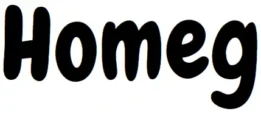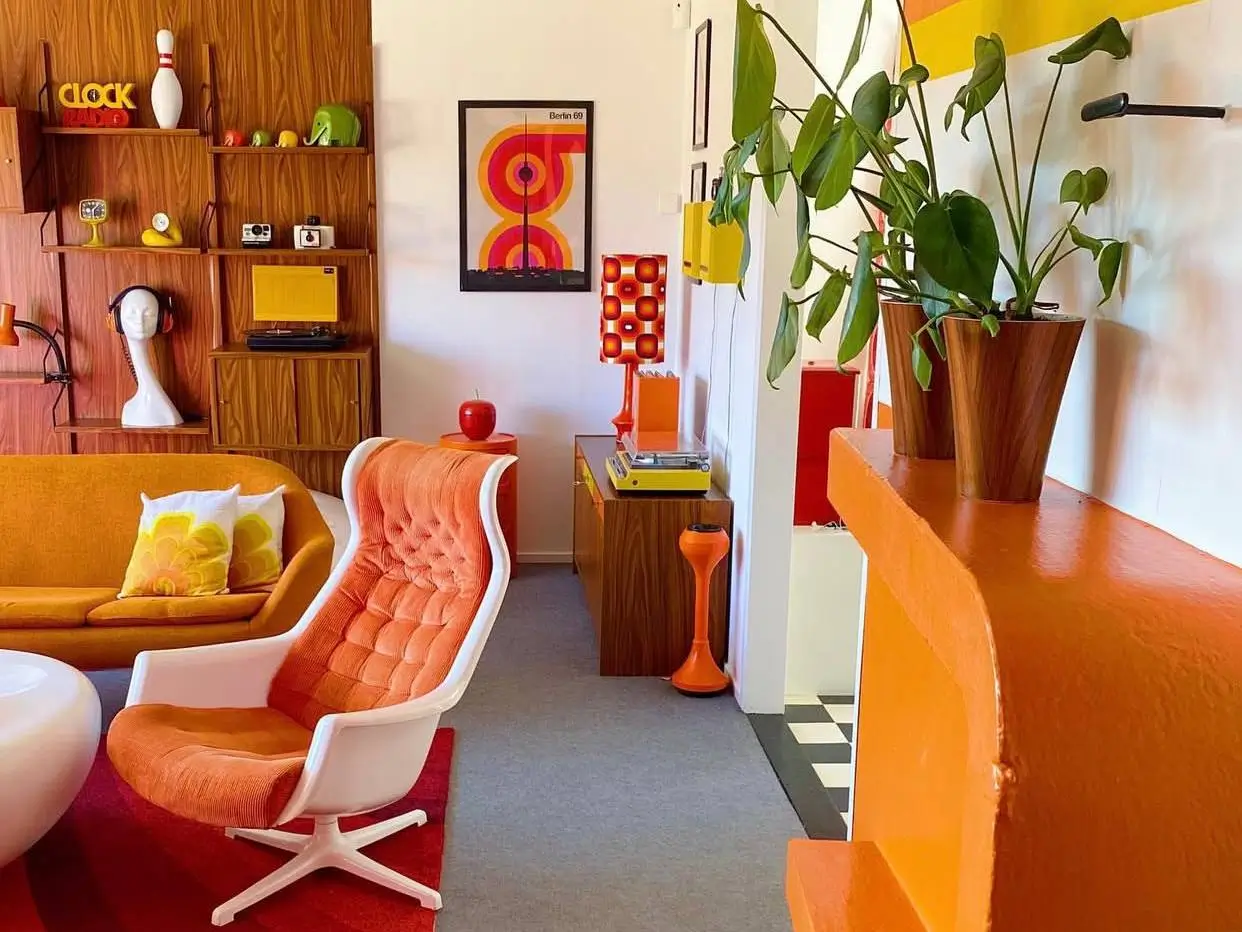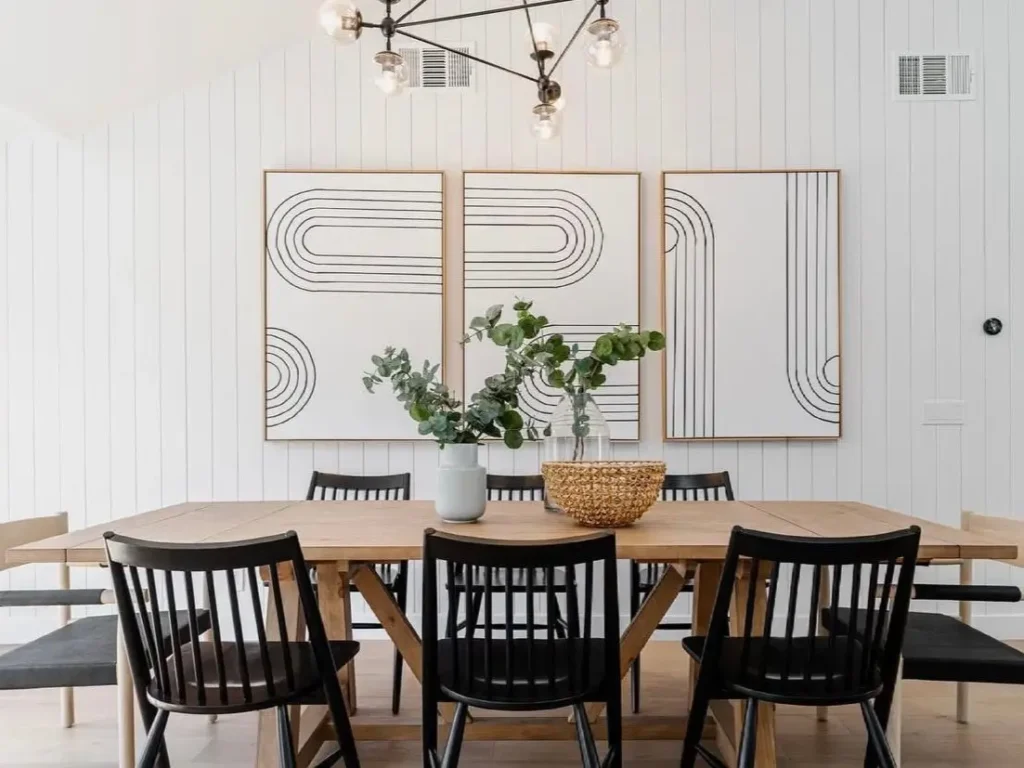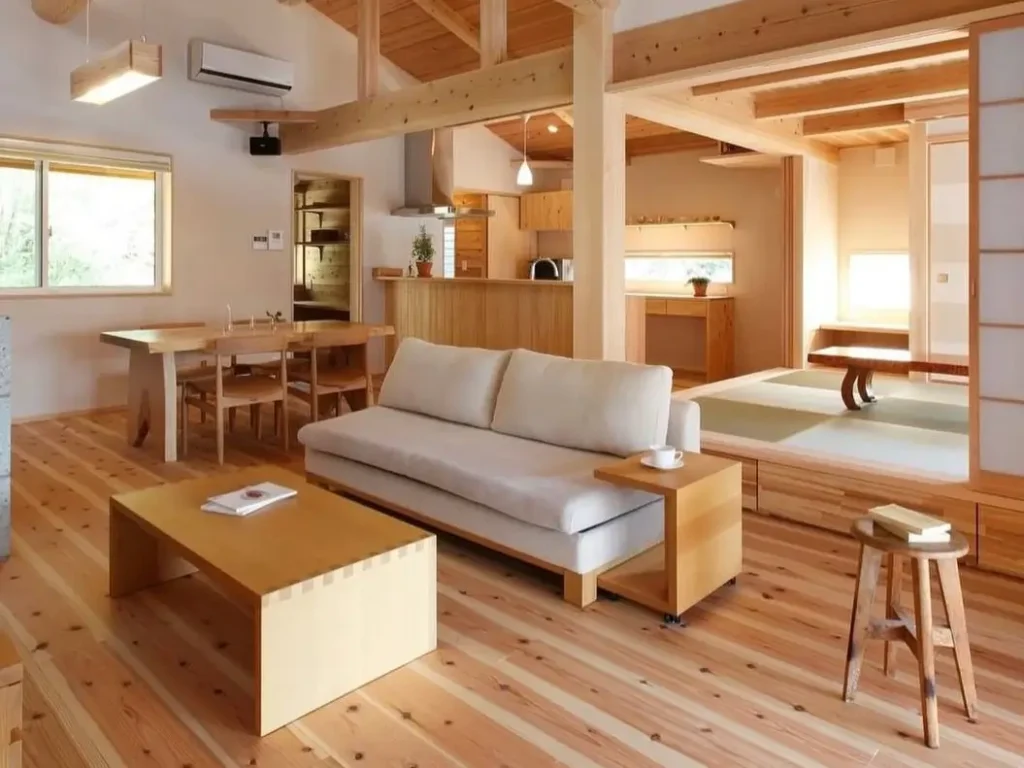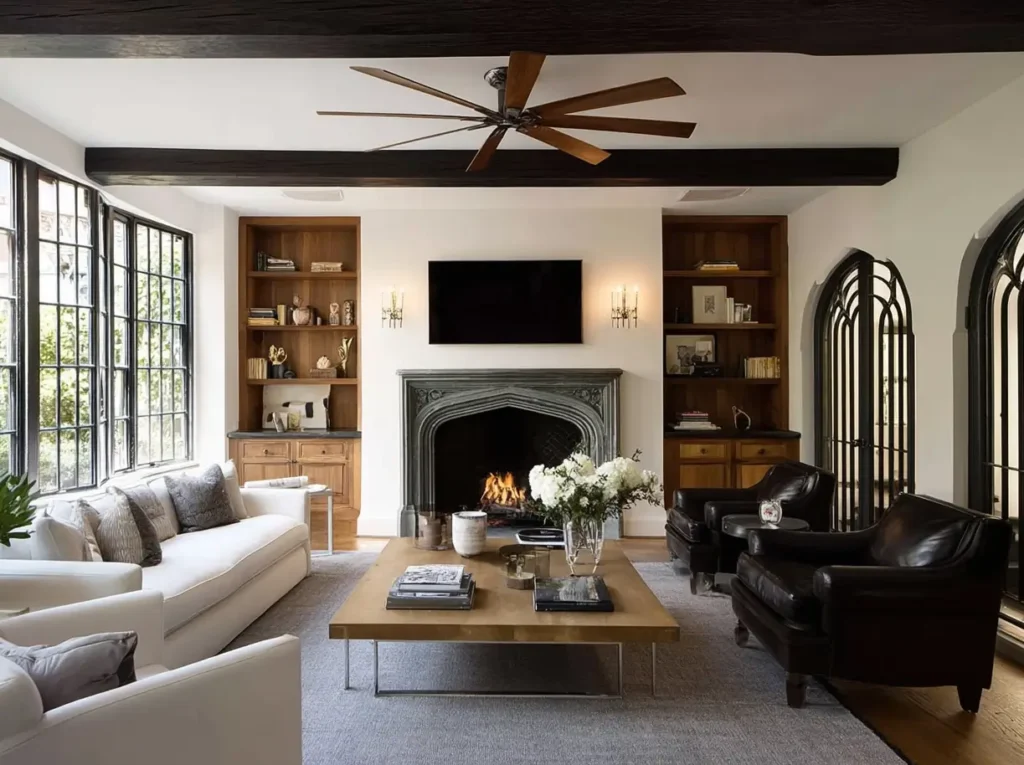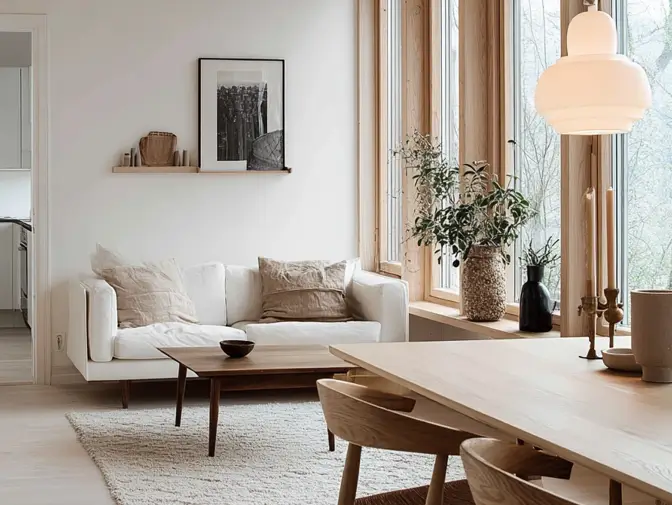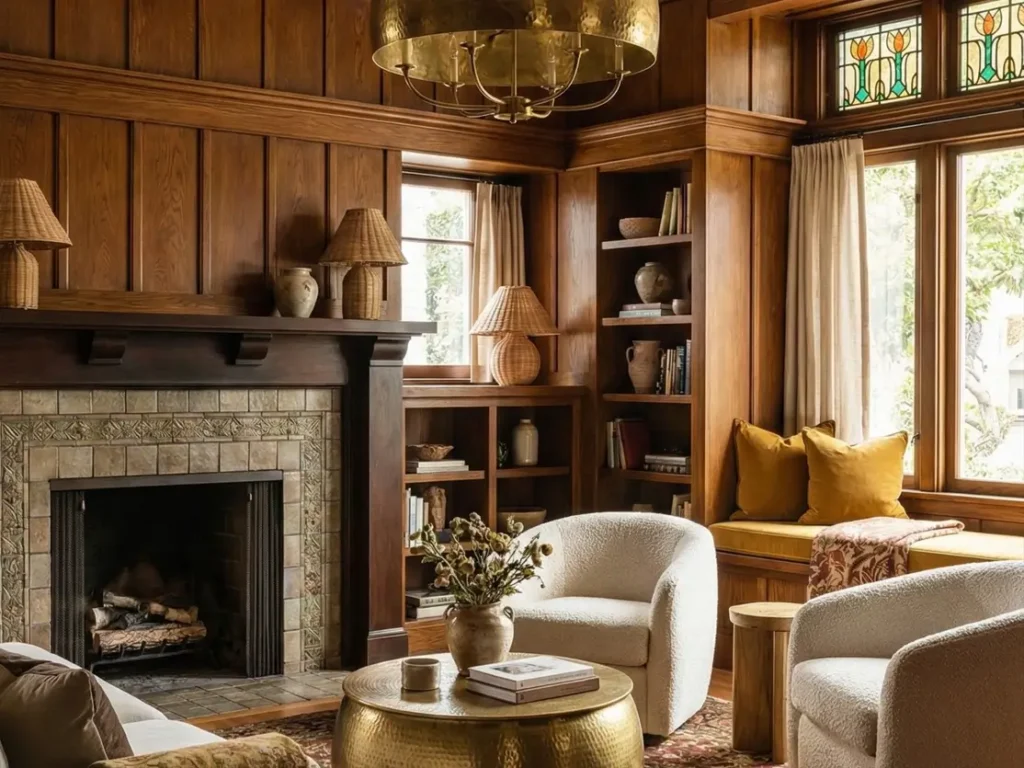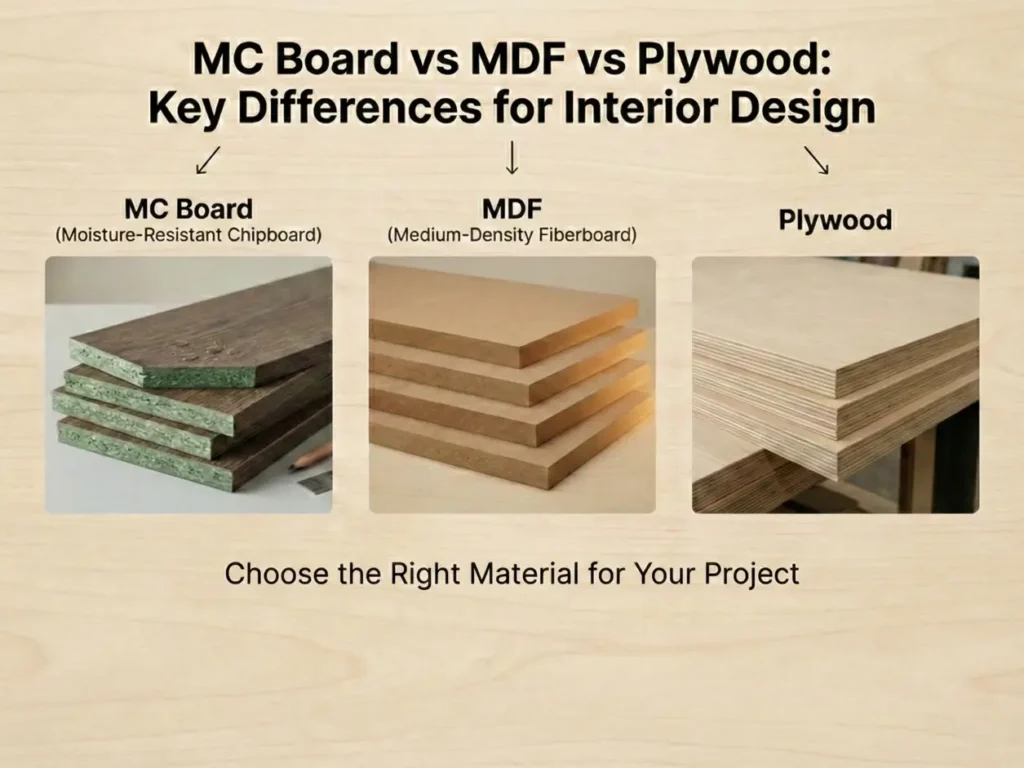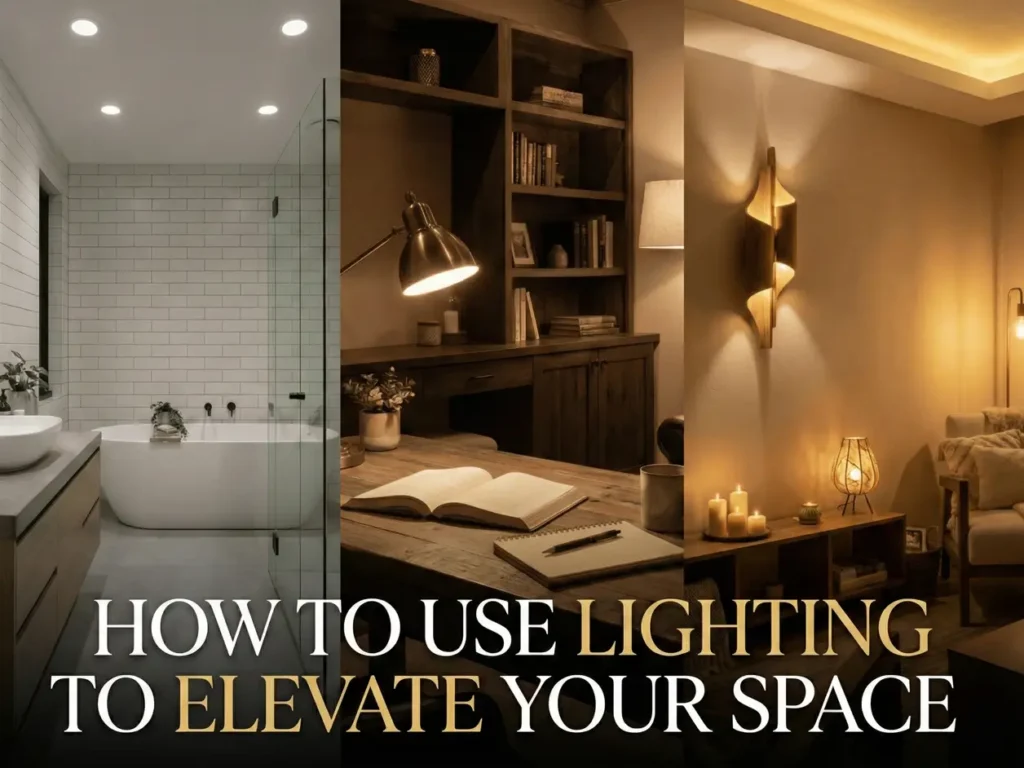Bold expression and earthy palettes are the hallmarks of the 1970s. This period of design rejected sterile minimalism, championing personality, comfort, and a deep connection to nature. Today, 70s interior design styles are experiencing a significant, sophisticated revival, often referred to as retro 70s interior design.
The celebrated look is characterized by its warm, saturated tones, plush textures, and confident graphic patterns. Mastering this style is about balancing these organic elements with futuristic forms and a curated sense of self-expression.
Offering a perfect counterpoint to modern simplicity, this guide provides the inspiration to do just that. We explore 26 distinct 70s interior design ideas, showing how to integrate iconic 70s interior decor into a contemporary home with confidence.
The Key Elements of 70s Interior Design
Before diving into the inspiration, it helps to understand the main components that define the retro 70s interior design aesthetic. This signature look is a dynamic mix of color, material, form, and pattern.
- Warm, Earthy Palettes: The foundation of the style. Think harvest gold, avocado green, burnt orange, and deep, chocolatey browns used with confidence to create an immersive, cozy atmosphere.
- Plush and Natural Textures: This era celebrated tactile surfaces. Key 70s interior decor includes shag rugs, velvet, and corduroy, alongside natural materials like rattan, teak wood, and brick for a layered, organic feel using natural fibers.
- Sculptural, Low-Slung Forms: Furniture became relaxed and futuristic. Low-profile modular sectionals, curved furniture, and sunken “conversation pits” encouraged lounging, while sculptural pod chairs and dome lighting added a ‘Space Age’ touch.
- Bold, Graphic Patterns: Pattern was a primary form of expression. Look for large-scale graphics, from swirling psychedelic motifs and oversized florals to repeating geometric prints on bold wallpaper, rugs, and textiles.
26 Inspiring 70s Interior Design Ideas
These examples showcase the diverse ways retro 70s interior design can be interpreted for today’s homes.
1. Warm Saturated Hues
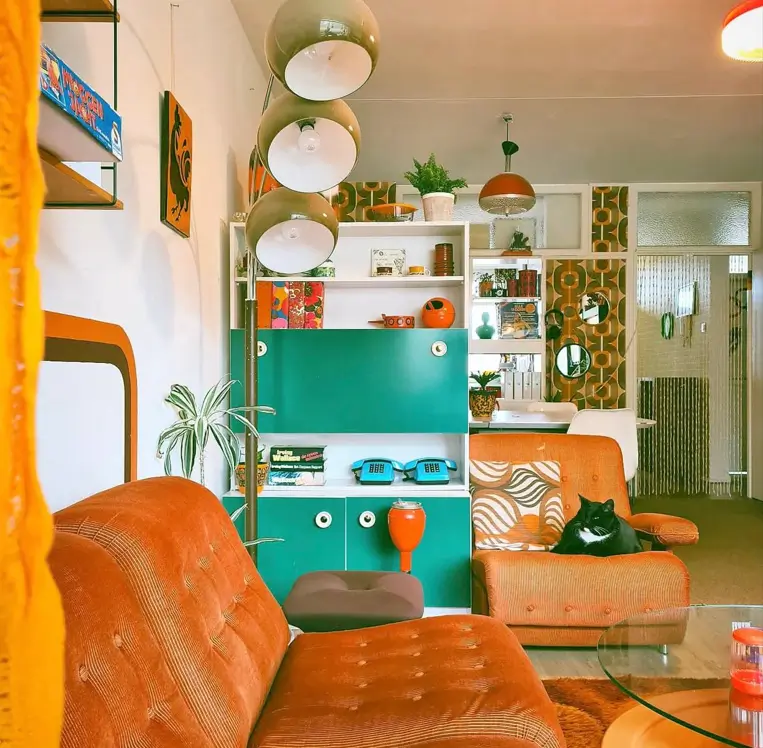
Warm, earthy tones are central to 70s interior design styles. This living room uses burnt orange and teal to create an inviting, enveloping space. These saturated colors pair perfectly with bold geometric patterns, defining the era’s confident and cozy aesthetic.
2. Graphic Color Statements
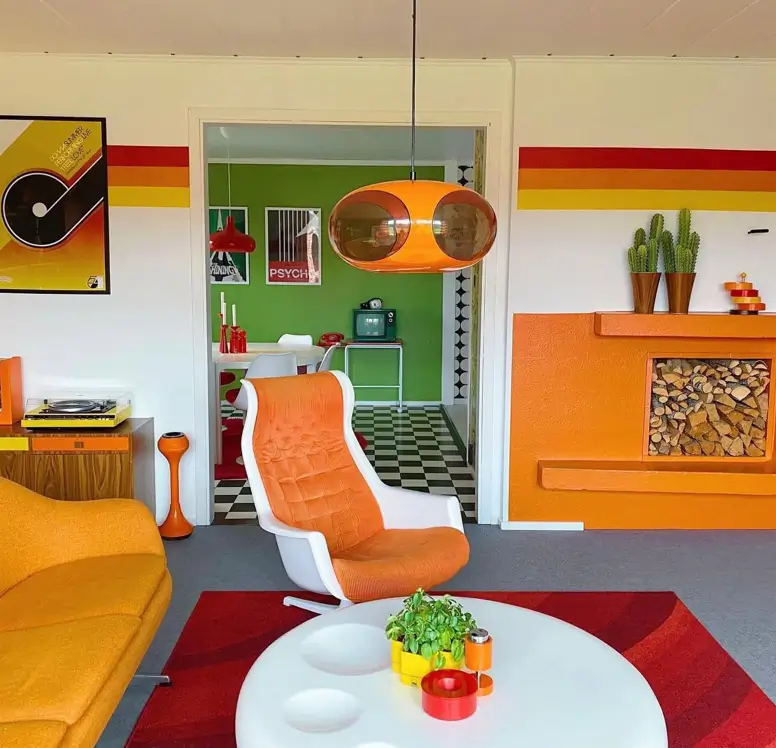
Bold graphic stripes in orange, red, and yellow define the architecture in this space. This approach is a hallmark of 70s interior design ideas. Paired with a futuristic pod chair and plastic lighting, the look showcases the era’s confident and playful side.
3. Layered Textural Elements
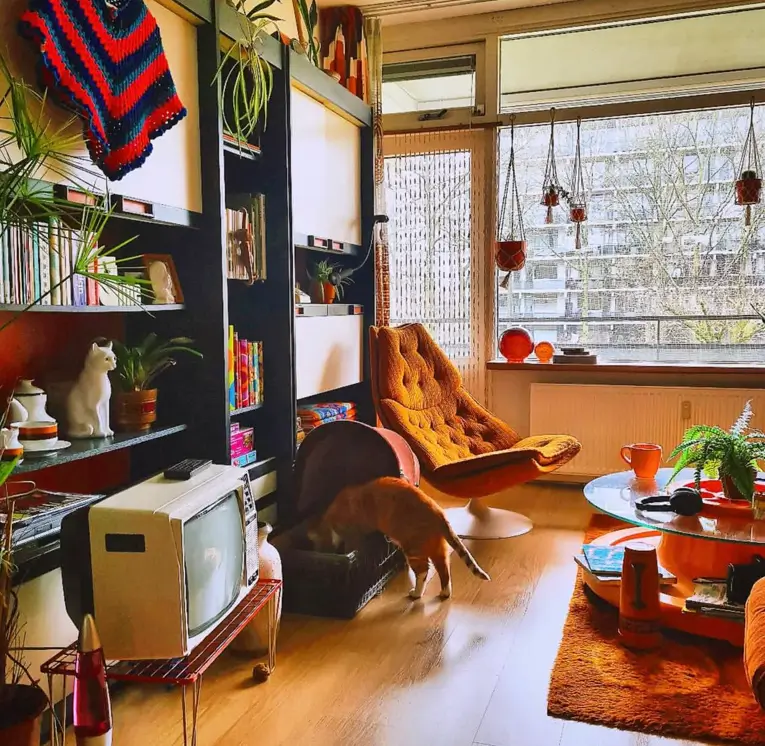
Texture is essential for authentic 70s interior decor. This room demonstrates a masterful mix, from the plush, tufted lounge chair in harvest gold to the high-pile shag rug. Macrame plant hangers and warm wood flooring complete the layered, tactile, and comfortable environment.
4. Fearless Pattern Play
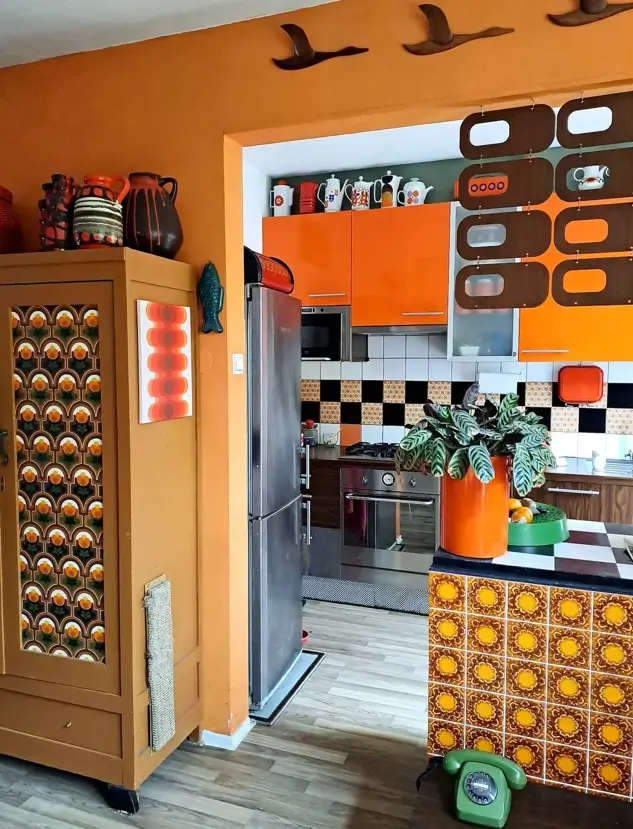
Fearless pattern mixing is a defining 70s interior design idea. This kitchen confidently layers checkerboard, scalloped, and floral motifs. A disciplined color palette of burnt orange and brown unifies the eclectic elements for a cohesive, energetic look.
5. Bold Geometric Prints
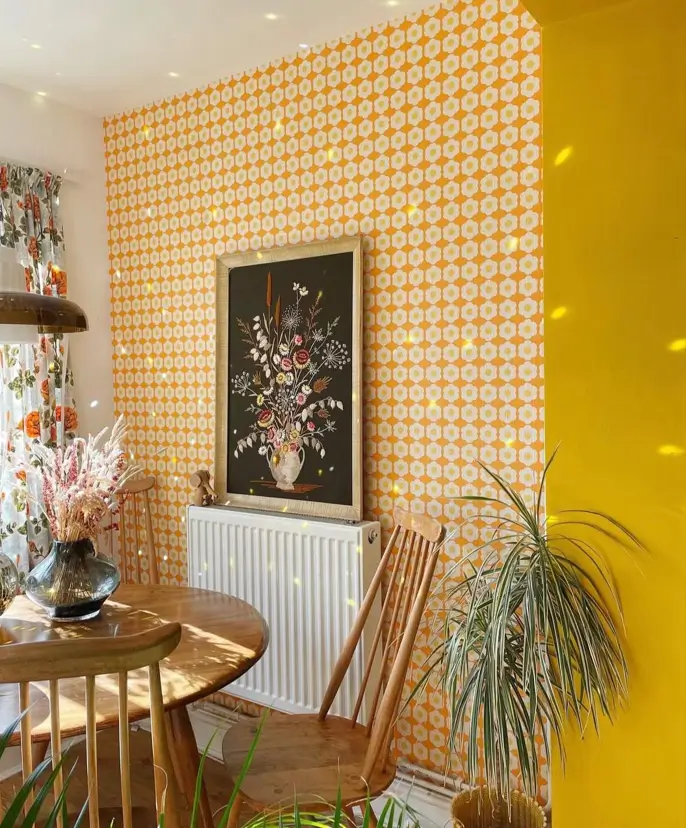
Bold geometric wallpaper in sunny hues creates an instant focal point, a classic 70s interior design idea. This space balances the strong pattern with the organic, simple lines of natural wood furniture, achieving a look that feels both vibrant and grounded.
6. Modular Wall Systems
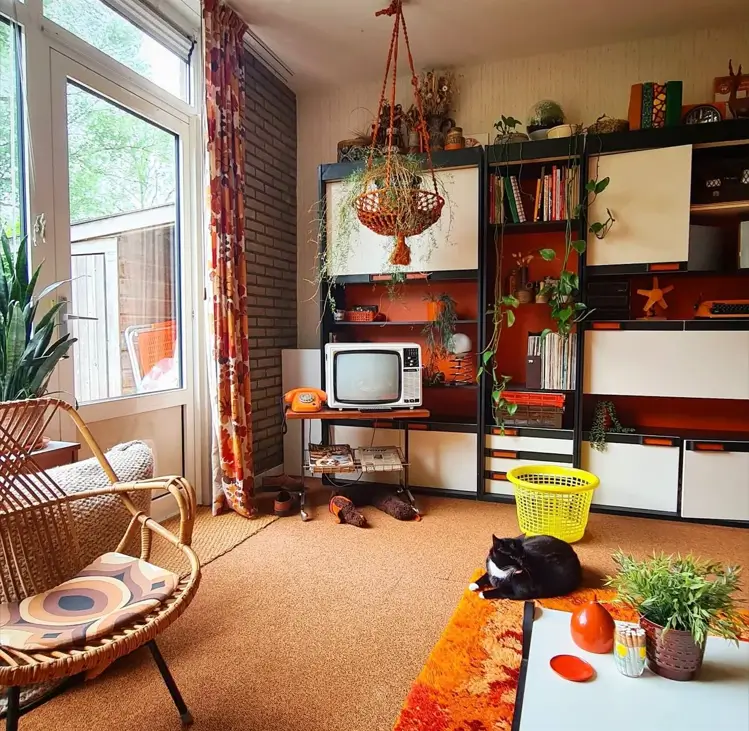
Flexible modular shelving defines this living area, a practical 70s interior design idea. The system’s clean lines contrast with organic textures like the rattan chair and macrame planter, creating a balanced and personal space for living.
7. Biophilic Pattern Mixing
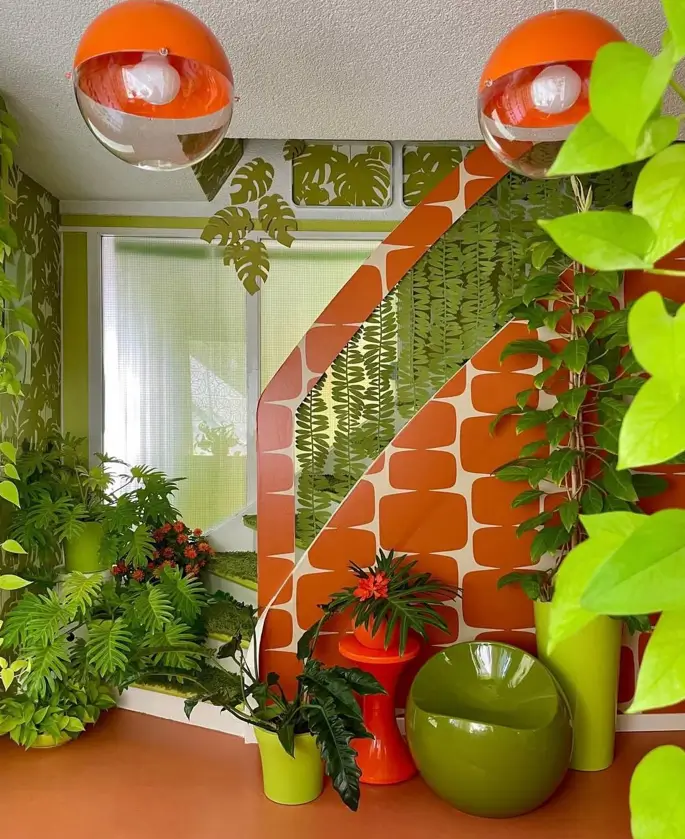
Vibrant orange and avocado green patterns create a high-energy backdrop for lush indoor plants. This mix of bold graphics with abundant greenery captures the era’s biophilic spirit. Sculptural plastic furniture and lighting complete this iconic 70s interior design style.
8. Signature Graphic Walls
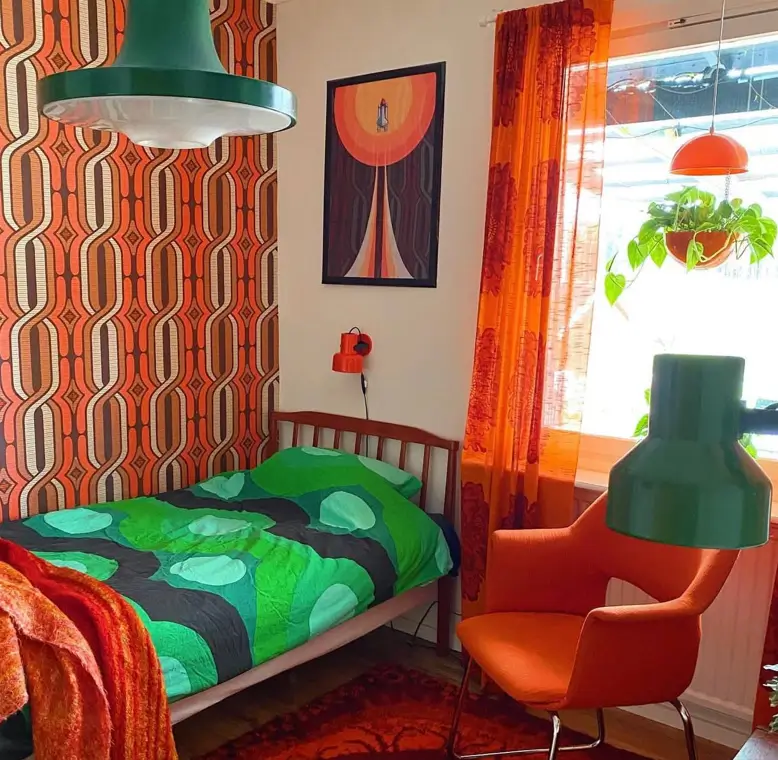
Large-scale graphic wallpaper creates a powerful statement, a popular 70s interior design idea. Here, a repeating geometric print in orange and brown provides a dynamic backdrop. This bold pattern is confidently paired with contrasting green and orange textiles for a layered look.
9. Rich Earth Tones
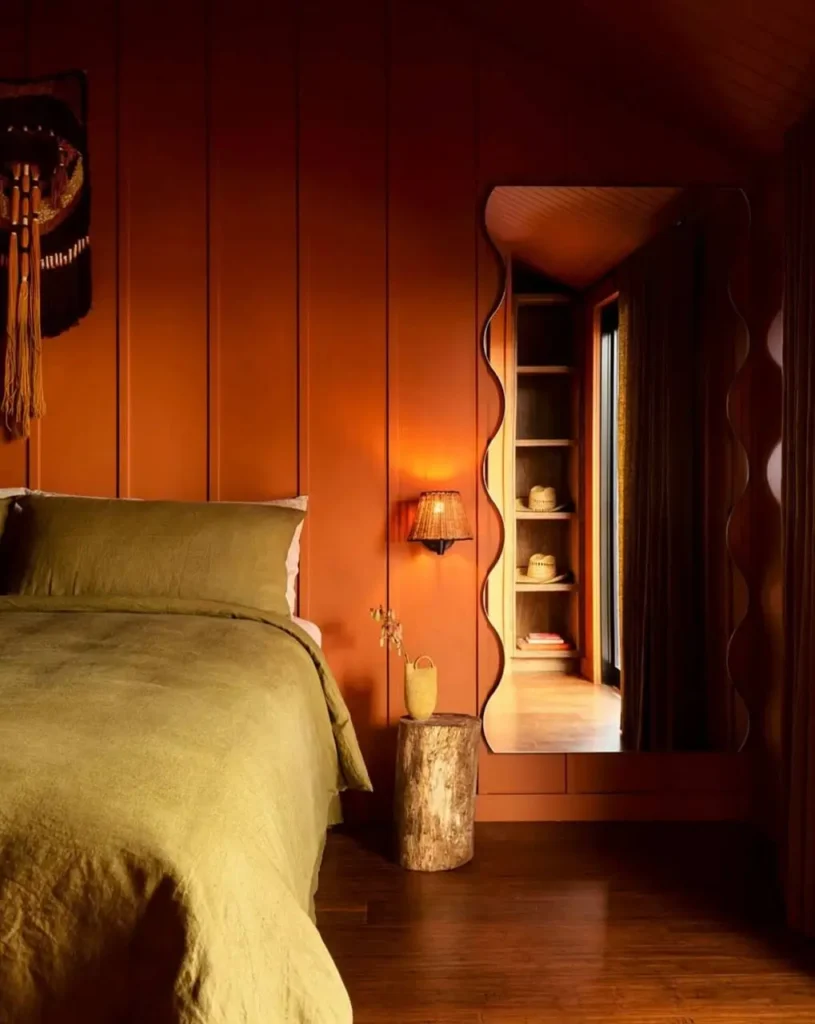
Rich earth tones create an immersive, warm space. The vertical wood paneling in deep rust is a classic 70s feature. Paired with olive green textiles and a sculptural, wavy mirror, this room showcases organic shapes and a deep connection to natural materials.
10. Eclectic Decorative Mix
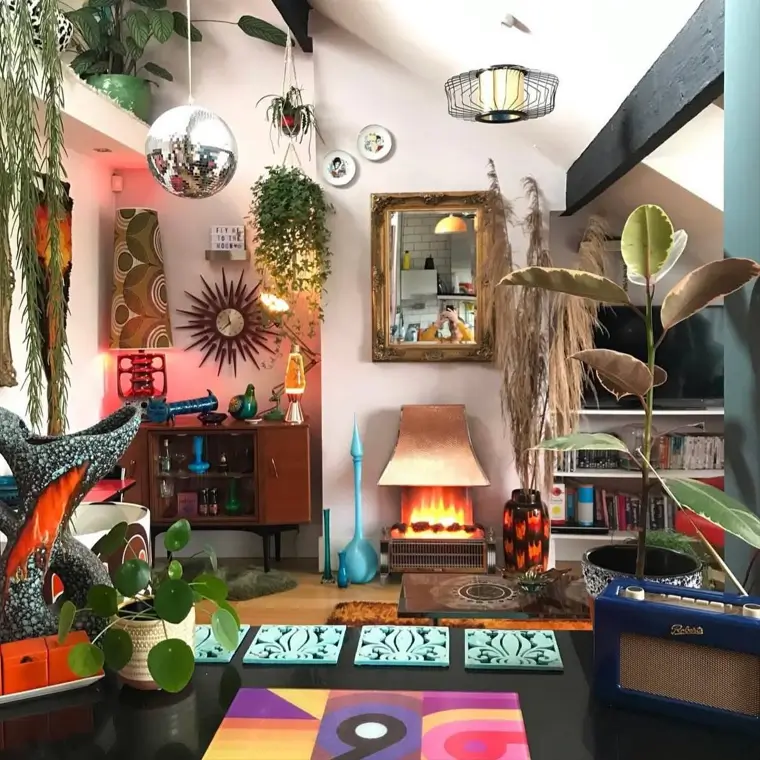
Eclectic accessories are central to 70s interior decor. This room mixes glam disco elements with earthy items like a starburst clock and lava lamp. The personal, curated feel is key to this nostalgic 70s interior design style, allowing for maximum self-expression.
11. Statement Patterned Rugs
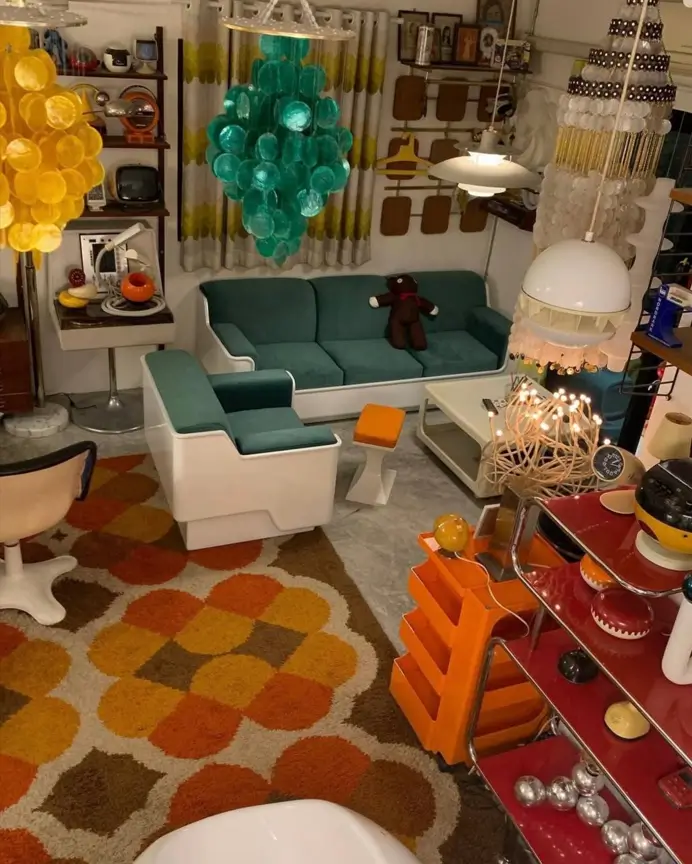
Large-scale patterned rugs are a cornerstone of 70s interior design ideas. This bold floral-geometric print in classic earth tones grounds the entire room. It provides the perfect foundation for futuristic plastic furniture and sculptural lighting, creating a dynamic, layered space.
12. Low-Profile Sectionals
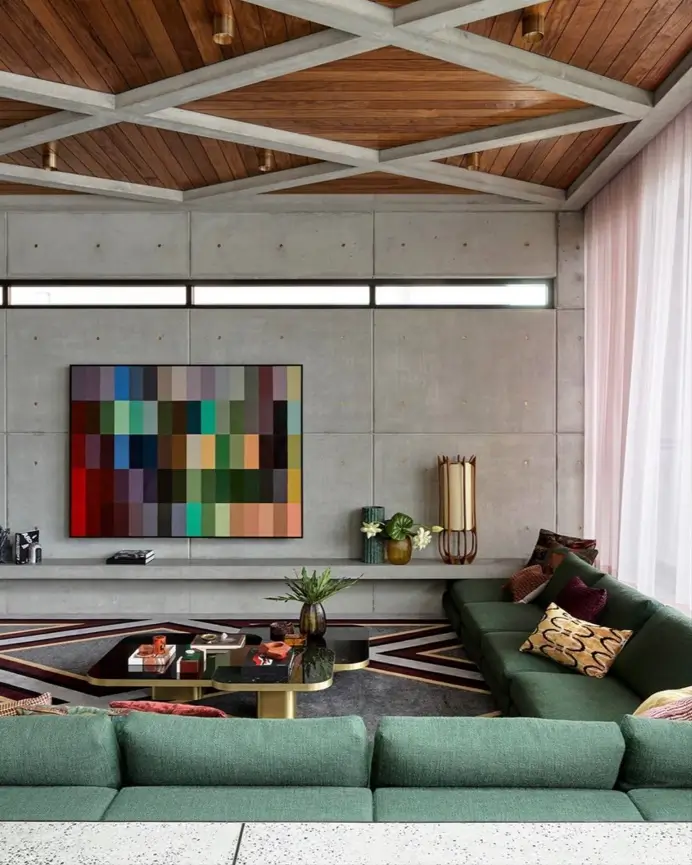
Low-slung modular seating in olive green defines this space as a nod to 70s design. It pairs beautifully with a bold geometric rug. Raw materials like the concrete walls and wood ceiling ground this contemporary take on a classic 70s interior design style.
13. Swirling Graphic Motifs
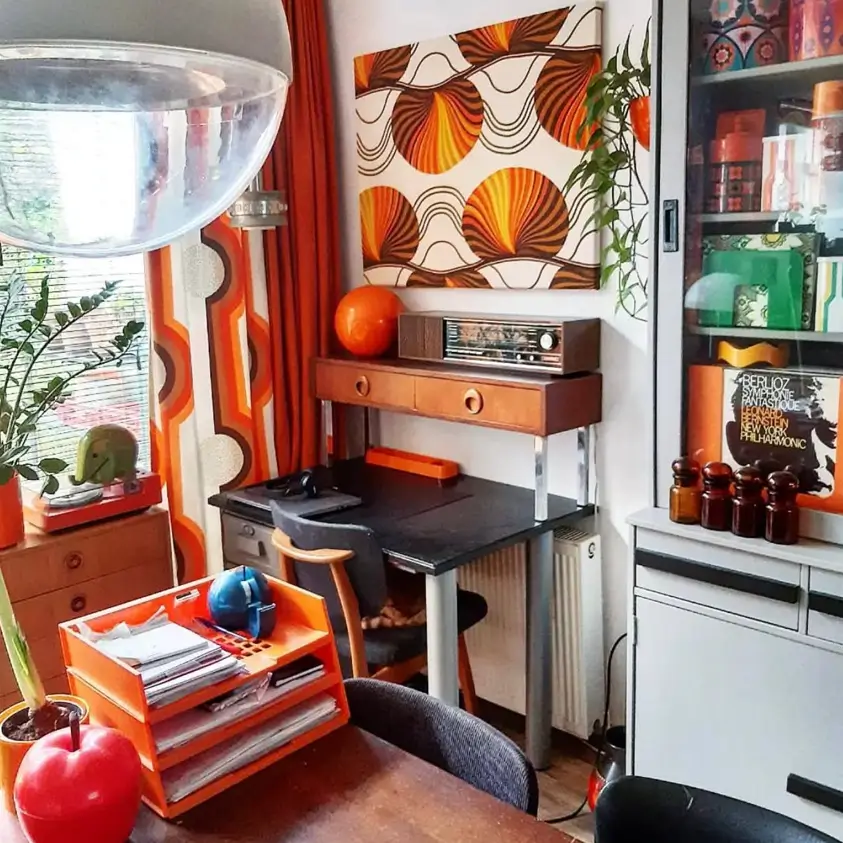
Graphic, swirling patterns in warm oranges and browns define this space. This 70s interior design idea is applied to both wall art and textiles, creating a cohesive and dynamic look. The repetition of the motif unifies the room’s decor.
14. Organic Rattan Elements
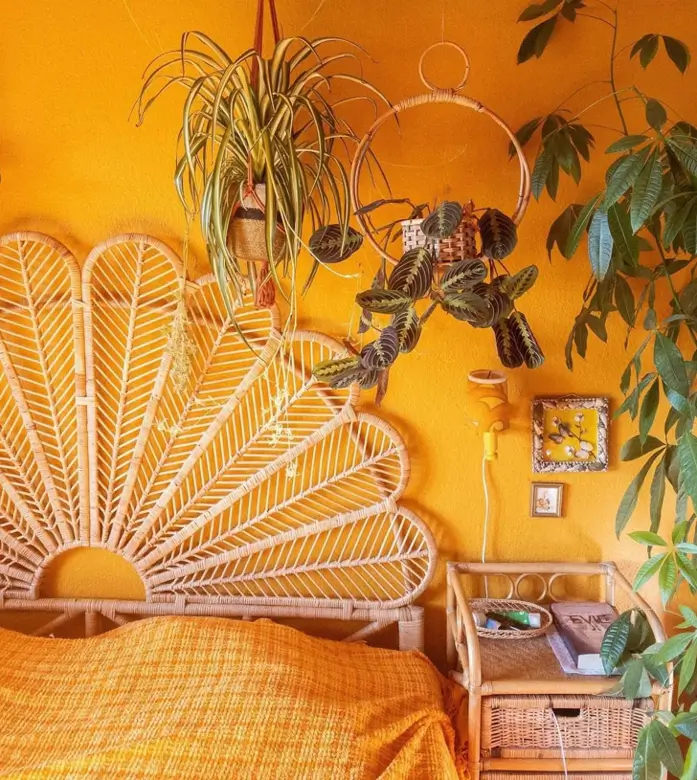
Rattan and wicker bring organic texture to 70s interior decor. This bedroom features an elaborate peacock headboard, set against a warm marigold wall. Abundant houseplants and woven textiles complete this nature-inspired, bohemian aesthetic.
15. Energetic Graphic Pop
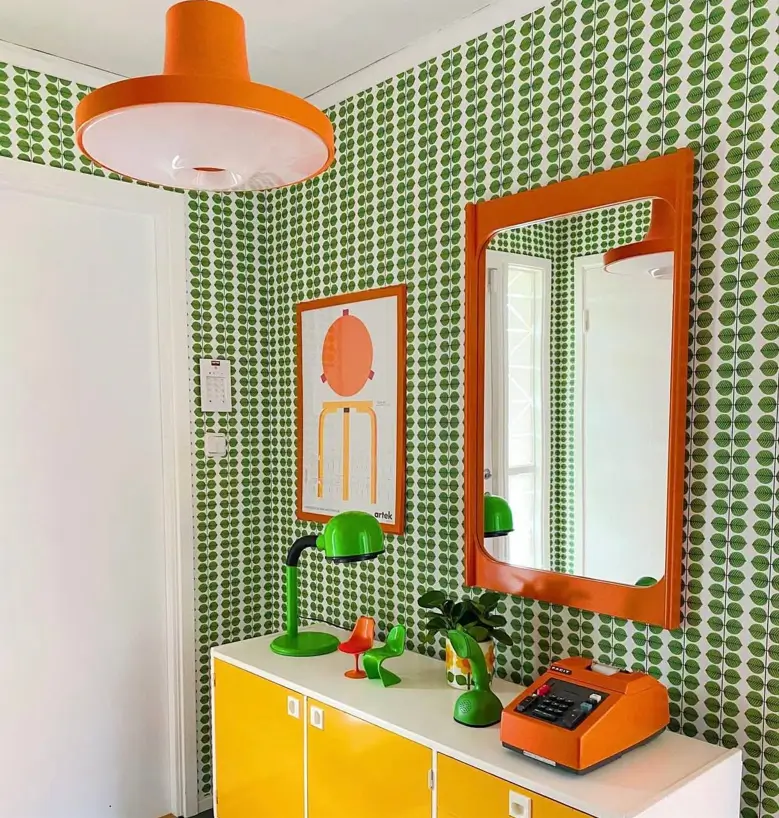
Playful graphic wallpaper in bright green sets an energetic tone. This 70s interior design style is amplified by pops of saturated orange and yellow on the mirror, lighting, and accessories. The look is pure 70s optimism, often using molded plastics.
16. Earthy Tiled Surfaces
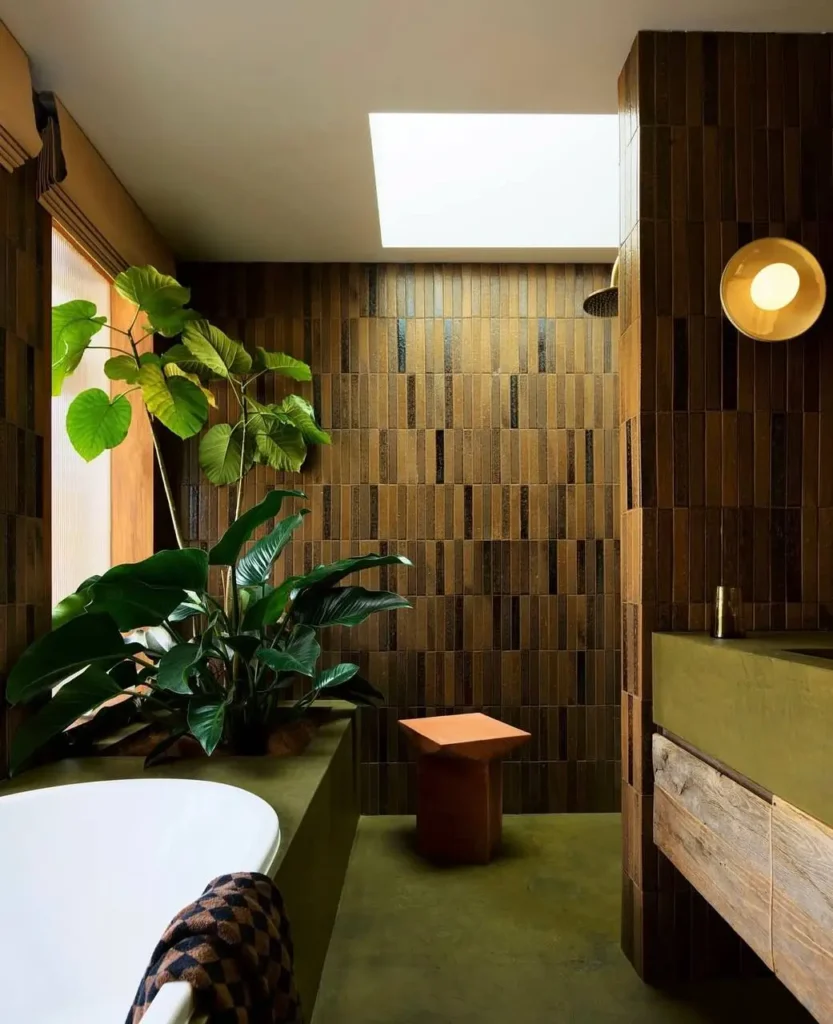
Earthy, textural tiles are foundational to 70s interior decor. This bathroom uses vertical brown-toned tiles to create a dramatic, organic shower enclosure. Paired with an olive green floor and rustic wood, the space feels like a natural retreat, a core 70s idea.
17. Bold Graphic Upholstery
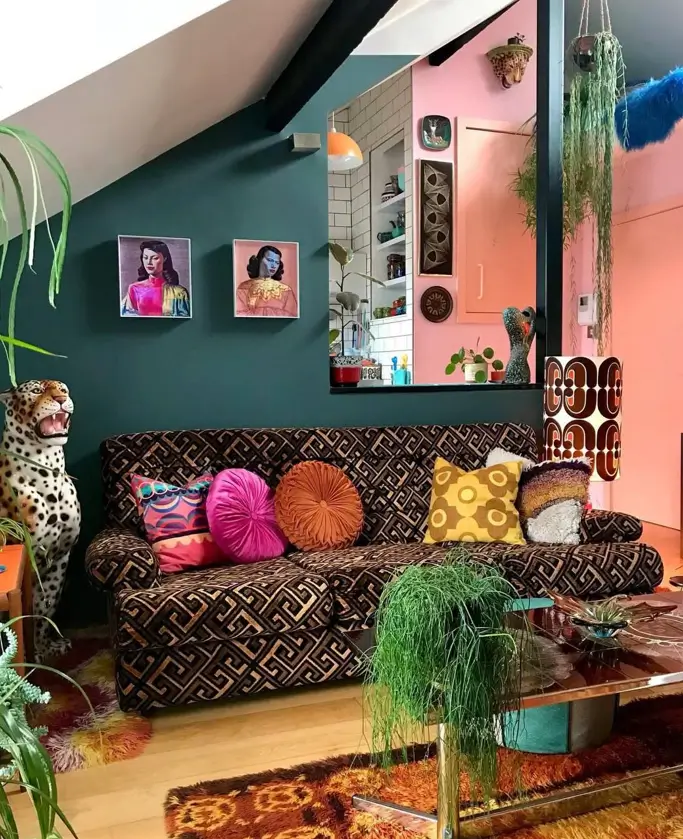
Bold geometric upholstery on the sofa grounds this highly eclectic space. This 70s interior design idea is confidently mixed with bright jewel-toned pillows, a shag rug, and a deep teal wall, showcasing a fearless approach to layering pattern and color.
18. Futuristic Forms
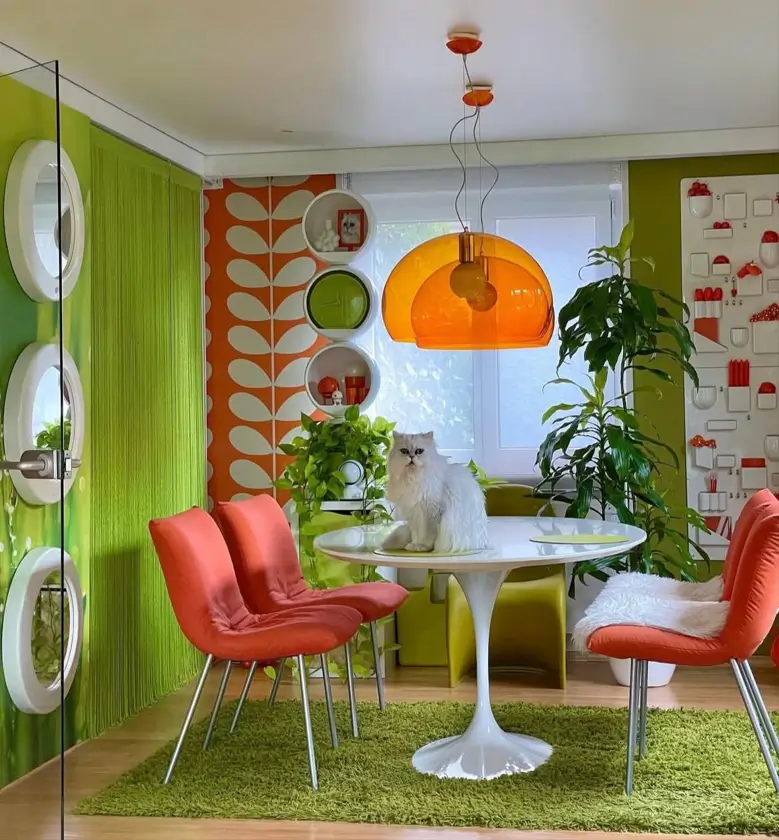
Futuristic shapes define this dining area. A classic tulip table is paired with bright orange chairs and a plastic dome pendant. This ‘Space Age’ element is key to retro 70s interior design, grounded here by an avocado green shag rug and bold, nature-inspired wall graphics.
19. Sculptural Plastic Shelving
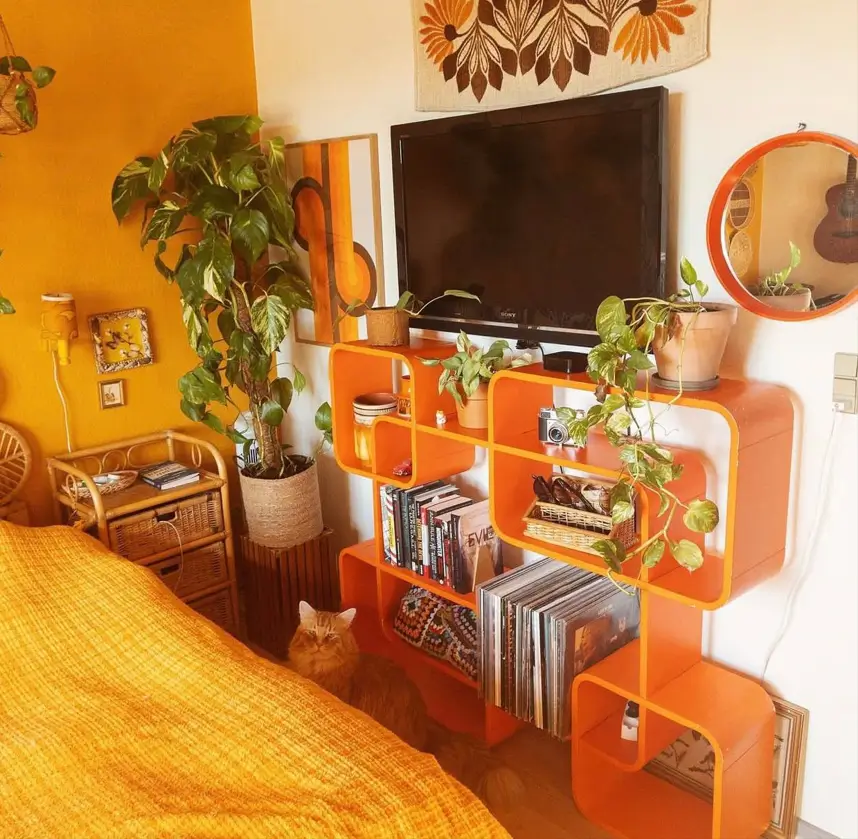
Bright orange, rounded-cube shelving creates a striking and functional focal point. This piece exemplifies the era’s love for plastic and modular forms. A monochromatic palette of warm yellows and oranges, combined with natural textures, completes this vibrant 70s interior design style.
20. Moody Glam Decor
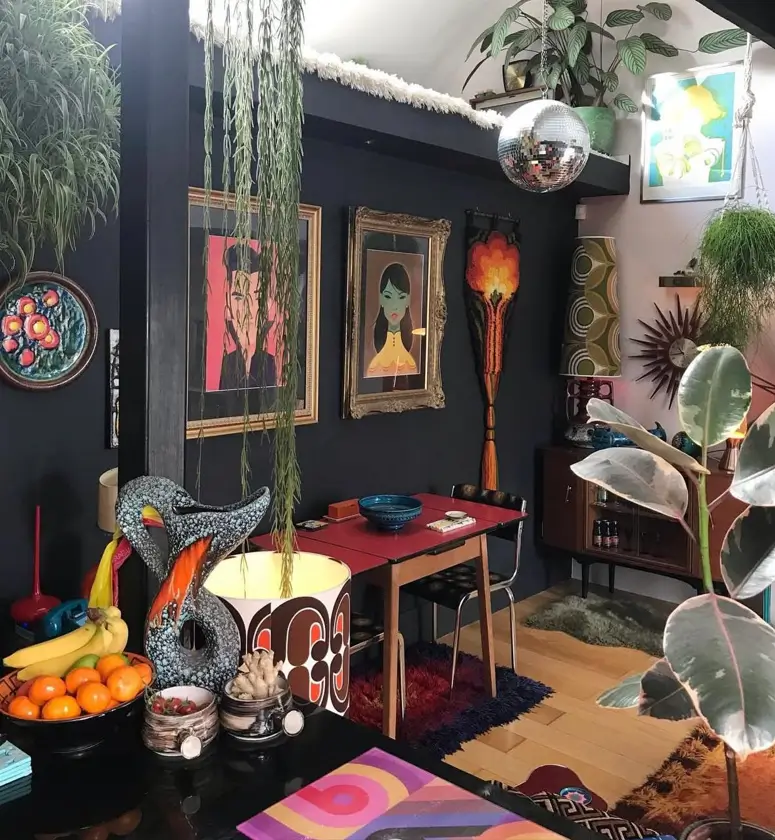
Dark, moody walls create a sophisticated backdrop for eclectic 70s interior decor. This dramatic setting makes the glam disco ball and bright red table pop. Abundant plants and art add a personal layer, showcasing a less common, glam-inspired 70s design idea.
21. Sculptural Plastic Forms
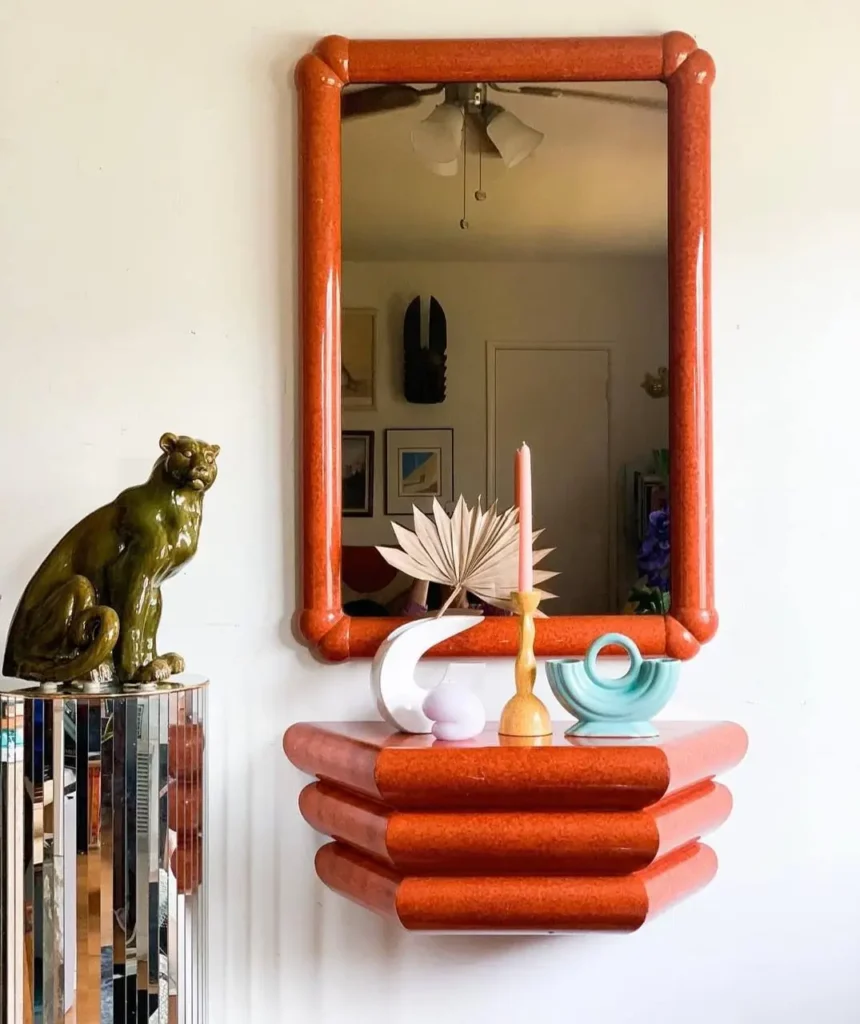
Chunky, rounded forms in plastic were a hallmark of the era’s futuristic pop aesthetic. This burnt orange mirror and shelf set is a perfect example. Paired with a mirrored pedestal and a ceramic leopard, it creates a quintessentially 70s glam vignette.
22. Architectural Wood Paneling
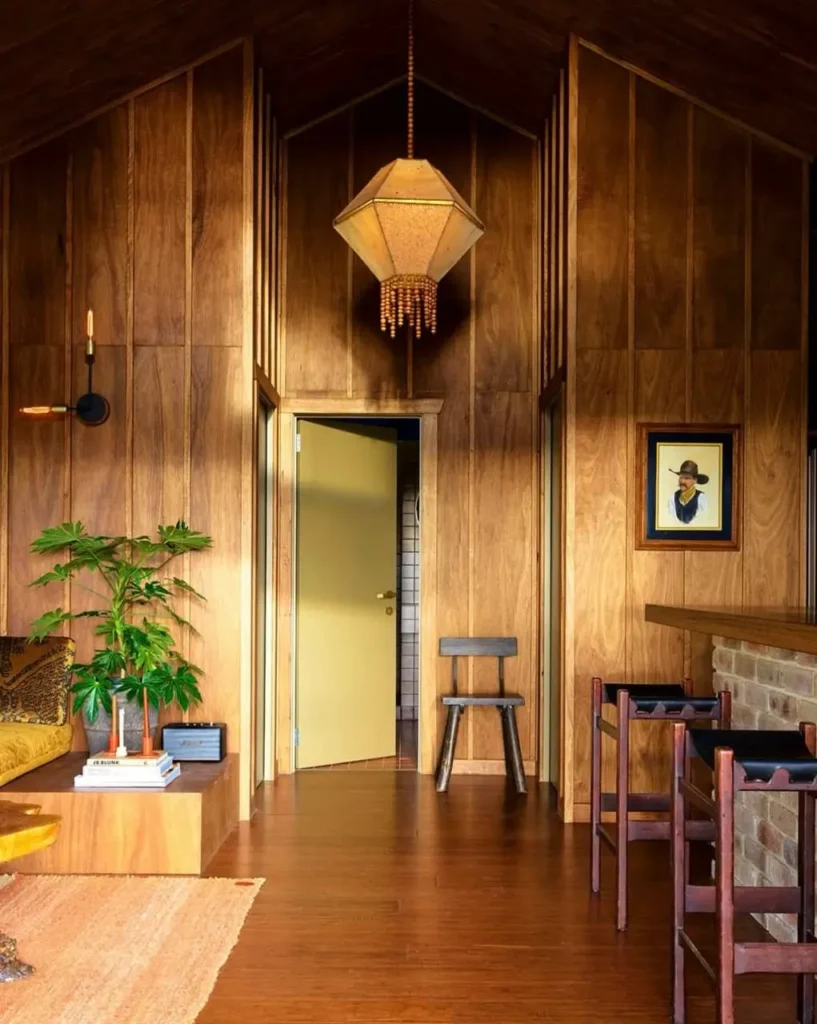
Floor-to-ceiling wood paneling defines this architectural space, creating an immersive warmth. This 70s interior design style is complemented by a brick bar and a large beaded pendant light, highlighting a deep focus on natural, textural materials.
23. Natural Textural Layers
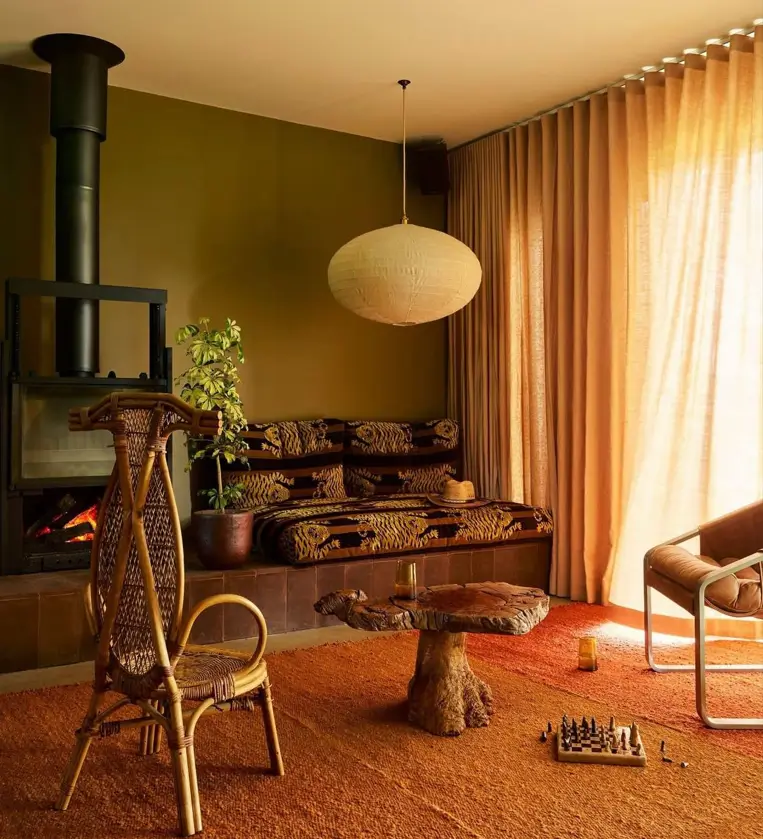
Deep olive walls and a rust-orange shag rug create a rich, earthy foundation. This 70s interior decor is layered with natural materials, including a sculptural rattan chair and a live-edge wood table, for a tactile and inviting atmosphere.
24. Sculptural Upholstery
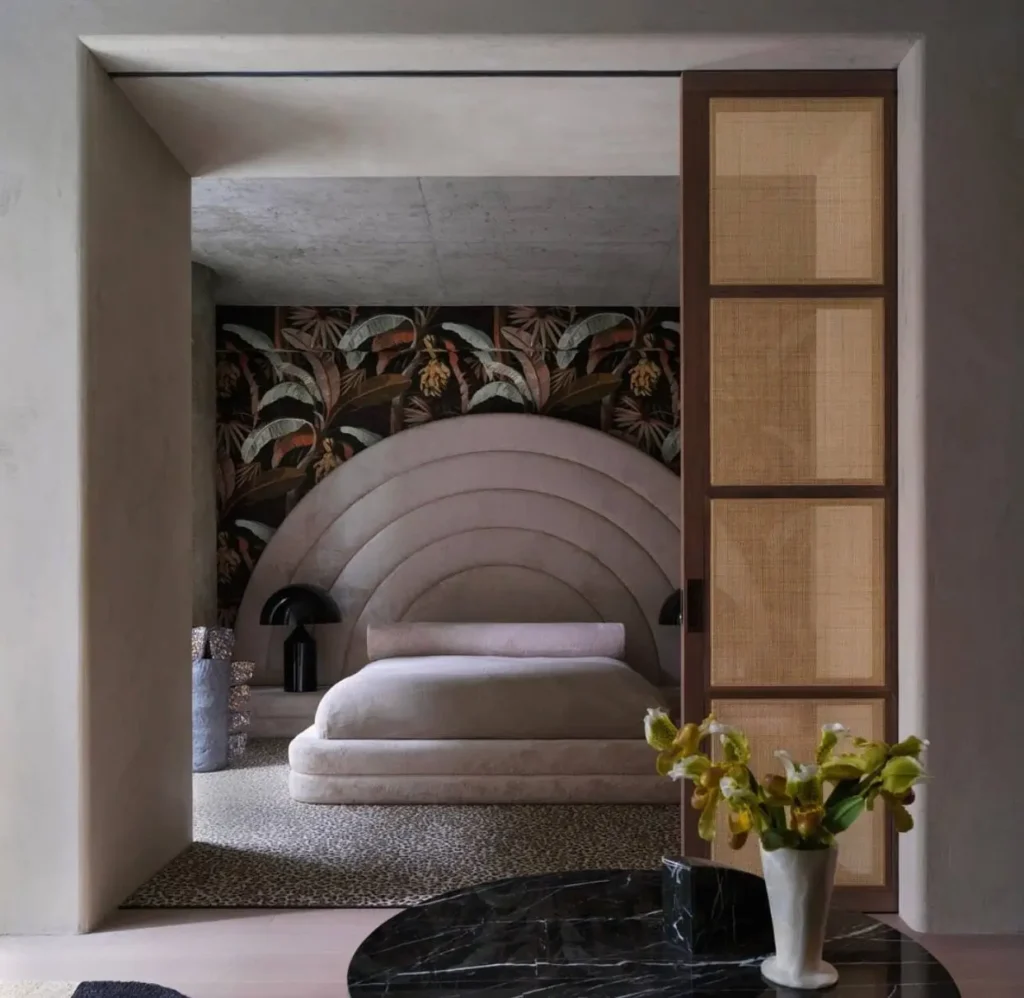
Sculptural, channel-tufted headboards provide a soft architectural focus. This glamorous 70s interior design idea is set against bold tropical wallpaper and balanced by the natural texture of a cane door, creating a sophisticated, layered retreat.
25. The Conversation Pit
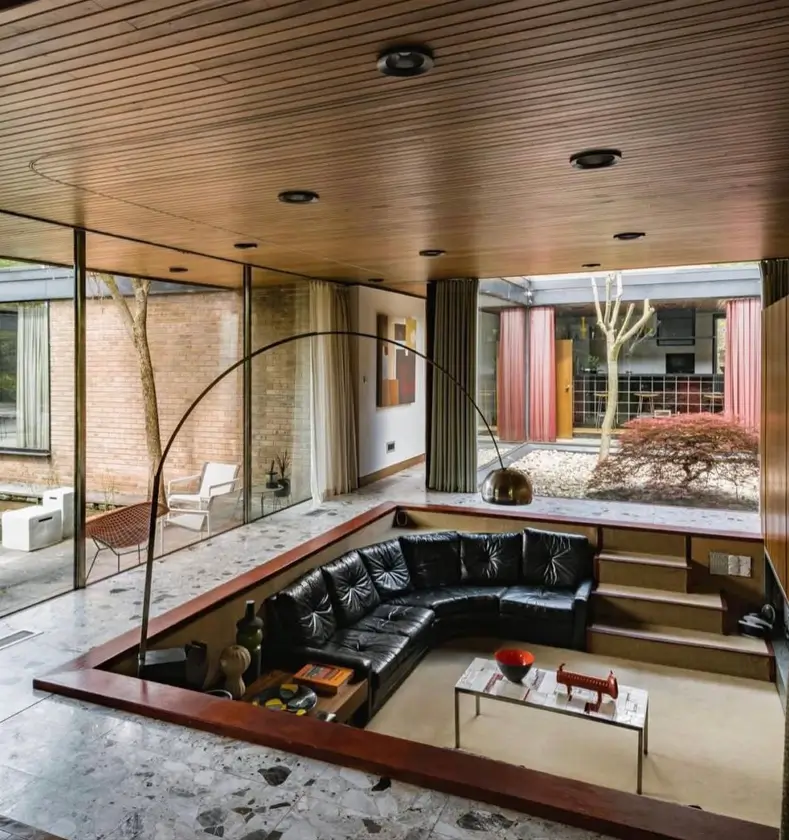
Sunken conversation pits are an iconic 70s interior design idea. This architectural feature creates an intimate gathering space. Here, it is defined by a black leather sectional and terrazzo flooring, blending seamlessly with the home’s natural wood ceiling and courtyard views.
26. Handcrafted Bohemian Layers
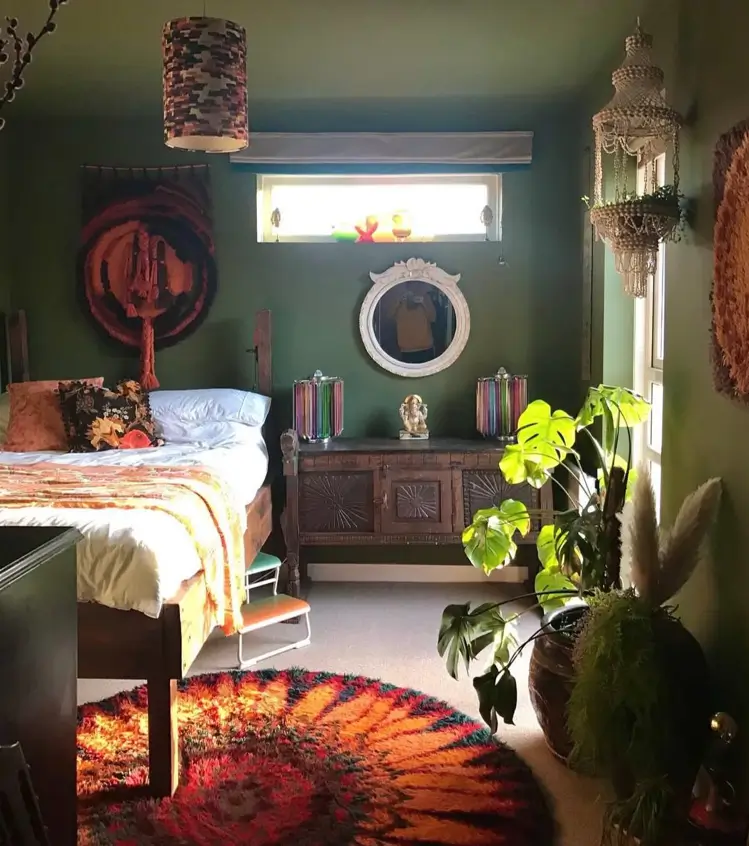
Deep green walls and a sunburst shag rug create a cozy bedroom with a bohemian feel. This 70s interior decor style relies on handcrafted textiles, like woven wall hangings and shell chandeliers. The look is personal, collected, and full of natural texture.
Bringing 70s Style into Key Rooms
Applying the 70s aesthetic doesn’t require an overhaul. Focus on key elements in specific spaces.
In the Living Room
Embrace low-profile seating like a plush velvet sectional in an earthy tone. Introduce texture with a shag rug and macrame plant hangers. Consider a statement piece like a sculptural arc lamp or a modular wall unit for storage.
In the Bedroom
Focus on warmth and texture. A rattan headboard, perhaps a peacock style, makes a strong statement. Layer bedding in warm hues like gold or rust, and add a handcrafted wall hanging above the bed.
In the Kitchen
Introduce the signature color palette through accessories or a bold backsplash tile. Consider open shelving to display retro ceramics. Natural wood cabinetry or accents also nod to the era’s organic feel.
Quick Guide: Do’s and Don’ts for Modern 70s Style
- DO embrace the warm, earthy color palette (orange, brown, gold, green) but balance it with neutrals.
- DON’T cover every surface in busy patterns. Use bold graphics strategically on wallpaper or rugs.
- DO layer textures like velvet, shag, rattan, and wood for a rich, tactile feel.
- DON’T rely solely on vintage pieces. Mix iconic 70s forms with contemporary furniture for a modern retro 70s interior design look.
- DO introduce sculptural or statement lighting like dome pendants or mushroom lamps.
- DON’T forget houseplants. Greenery is essential for the era’s biophilic vibe.
- DO consider natural wood tones, including wood paneling accents where appropriate.
- DO curate accessories. Opt for a few key pieces like a lava lamp or sunburst mirror, rather than clutter.
A Modern Approach to 70s Decor
Integrating 70s interior decor is about balance, not creating a time capsule. Start by introducing one or two key elements. A sculptural velvet chair or a statement shag rug can anchor a room. Focus on the warm color palette and rich textures first, layering them into your existing modern space.
For an easy entry point, begin with textiles. Incorporate velvet or corduroy throw pillows in harvest gold or burnt orange. Introduce a small, high-pile shag rug with a geometric pattern. Alternatively, add a touch of nature with a rattan side table or a macrame plant hanger. The key is to curate, mixing vintage-inspired forms with contemporary pieces for a look that feels personal and timeless.
Your 70s Design Questions Answered
How do I make 70s interior decor look modern?
To keep 70s interior decor feeling modern, focus on curation. Use 70s elements as accents rather than a complete theme. For example, pair a velvet sofa in a 70s hue with modern, neutral walls. Or, use a single statement shag rug in a room with contemporary furniture. It is about balancing the bold with the simple.
What is the difference between 60s and 70s interior design?
The simplest distinction is color and material. 60s design was defined by the Space Age and Pop Art. It featured bright primary colors, high-contrast black and white, and molded plastics. 70s design shifted to an earthier, more natural look. It embraced browns, oranges, and greens, and championed materials like rattan, wood, and macrame.
What are the most iconic 70s decor items?
The most iconic 70s decor items often include shag rugs, macrame plant hangers, and lava lamps. Other key pieces include sculptural dome or globe lighting, large-scale graphic wallpaper, modular shelving systems, low-profile velvet or corduroy sofas, and sunken living rooms (conversation pits).
Embracing the 70s Vibe
Ultimately, the enduring appeal of retro 70s interior design lies in its warmth, personality, and celebration of self-expression. By thoughtfully integrating its key colors, textures, and forms, you can create a space that feels both nostalgic and refreshingly contemporary.
